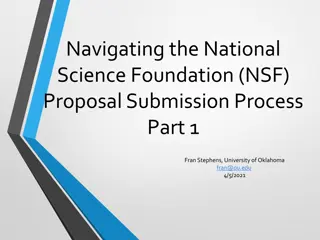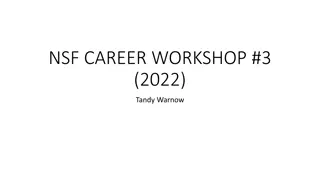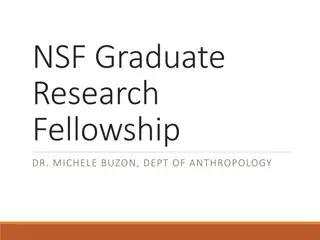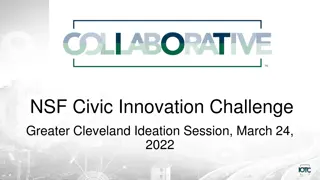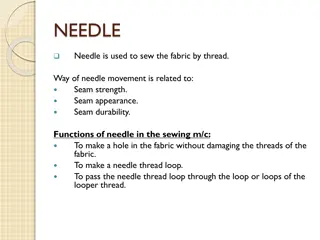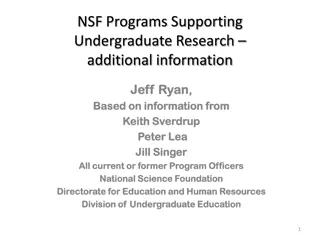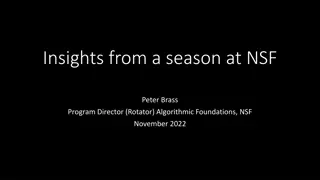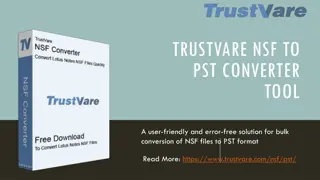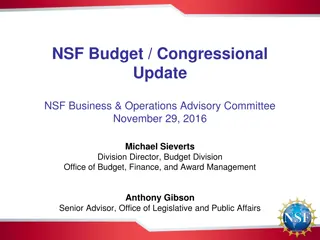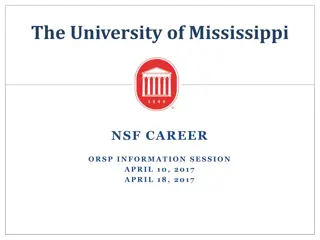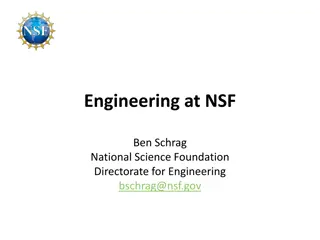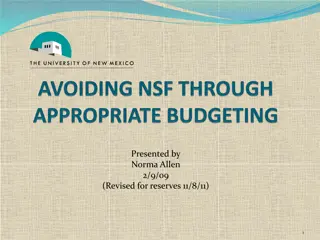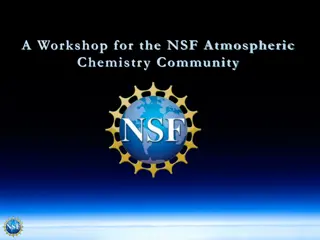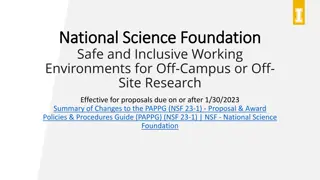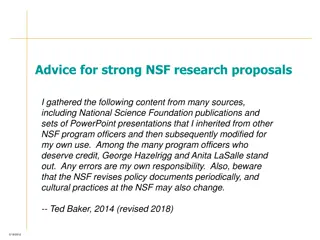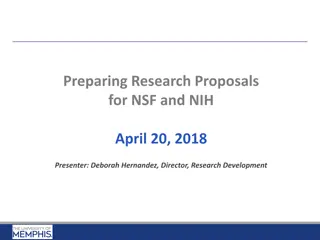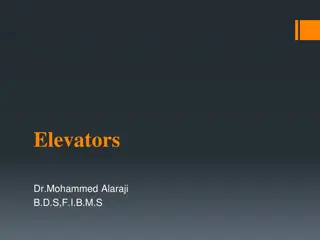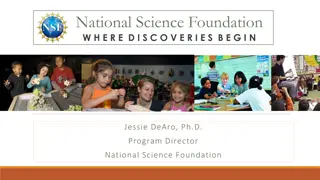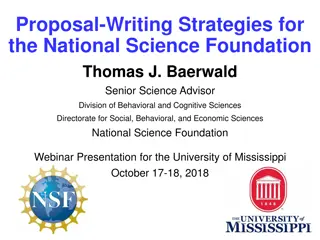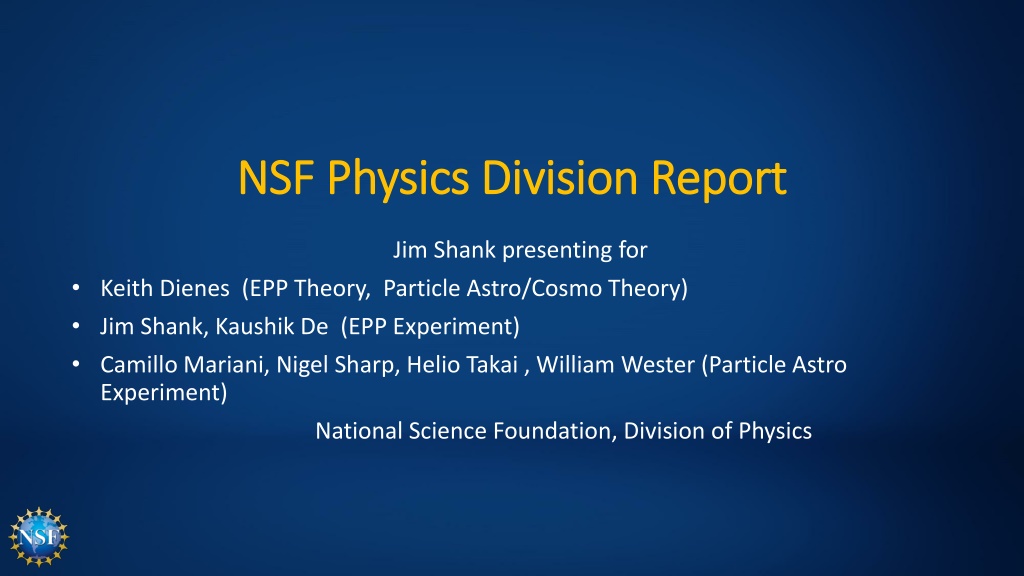
Advanced Particle Physics and Cosmology Research Overview
Explore the latest developments in Particle Physics, Elementar Particles, Particle Astrophysics, and Cosmology through the NSF Physics Division Report. The report covers theoretical and experimental programs, core research areas, and funding opportunities. Get insights into cutting-edge research in High-Energy Physics and Particle Astrophysics/Cosmology, supported by the Division of Physics.
Download Presentation

Please find below an Image/Link to download the presentation.
The content on the website is provided AS IS for your information and personal use only. It may not be sold, licensed, or shared on other websites without obtaining consent from the author. If you encounter any issues during the download, it is possible that the publisher has removed the file from their server.
You are allowed to download the files provided on this website for personal or commercial use, subject to the condition that they are used lawfully. All files are the property of their respective owners.
The content on the website is provided AS IS for your information and personal use only. It may not be sold, licensed, or shared on other websites without obtaining consent from the author.
E N D
Presentation Transcript
NSF Physics Division Report NSF Physics Division Report Jim Shank presenting for Keith Dienes (EPP Theory, Particle Astro/Cosmo Theory) Jim Shank, Kaushik De (EPP Experiment) Camillo Mariani, Nigel Sharp, Helio Takai , William Wester (Particle Astro Experiment) National Science Foundation, Division of Physics
Overview Overview NSF Physics Division New personnel Overview of EPP, PA programs Funding Opportunities USLUO Dec 2024
Division of Physics Core Research Programs Gravitational Physics + LIGO research Pedro Marronetti Atomic, Molecular, & Optical Physics Experiment: John Gillaspy, Kevin Jones, Mark Beck Theory: Nuclear Physics Experiment: Allena Opper; Vicki Greene Theory: Bogdan Mihaila Plasma Physics Slava Lukin, Jeremiah Williams Elementary Particle Physics Experiment: Jim Shank , Kaushik De Theory: Keith Dienes Physics of Living Systems Krastan Blagoev, Angel Garcia Particle Astrophysics Experiment: Camillo Mariani, Helio Takai, William Wester Theory (+cosmology): Keith Dienes Quantum Information Science Alex Cronin, Mark Byrd USLUO Dec 2024
Experimental EPP Program Experimental EPP Program Elementary Particle Physics (EPP) Program, which primarily supports particle physics at accelerators and advances in detector development. Range of program coverage: High Energy Physics (ATLAS, CMS, ) Precision Experiments (Neutrinos, LHCb, Rare-K, EDMs, ), LHCb M&O Tools for Particle Physics (Artificial Intelligence, Instrumentation, ) Program Directors: K. De, J. Shank EPP Program FY 2015 FY 2016 FY 2017 FY 2018 FY 2019 FY 2020 FY 2021 FY 2022 FY 2023 FY 2024 Awards issued 19 12 7 18 15 15 20 18 16 16 CAREER awards 1 2 1 1 0 3 0 0 1 0 USLUO Dec 2024
The EPP experiment FY2024 Portfolio: The EPP experiment FY2024 Portfolio: Science Thrust No. Proposals ATLAS 5 CMS 3 LHCb 3 Neutrino 3 HiFieldQED 1 Belle II 1 Grand Total 16 USLUO Dec 2024
Theoretical HEP and Particle Astro/Cosmology Programs Particle Theory is essential to the success of the entire Particle Physics mission. We support cutting-edge investigator-driven research in two programs: Theoretical High-Energy Physics Theoretical Particle Astrophysics and Cosmology Regular interactions with EPP, PA, Gravity Theory, Nuclear Theory, Astronomy, Materials Research, Mathematical Sciences, etc. Supporting individuals, RUI's, and special facilities or initiatives (Aspen Center for Physics, TASI summer school, LHC Theory Initiative, etc.) Trend: Large numbers of proposals, also increasing numbers of new PIs applying Program Director: K. Dienes Theory Programs FY 2015 FY 2016 FY 2017 FY 2018 FY 2019 FY 2020 FY 2021 FY 2022 FY 2023 FY 2024 Awards issued 28 30 26 32 23 32 30 30 30 35 CAREER awards 2 1 2 1 1 1 1 0 1 0 USLUO Dec 2024
Experimental Particle Astrophysics Programs Experimental Particle Astrophysics Programs Underground Physics (PA-UG): This area supports university research that generally locates experiments in low background environments: Underground experiments, reactor neutrinos, coherent scattering (with ENP) Neutrino mass measurements Searches for the direct detection of Dark Matter IceCube Science Program (PA-IC): This area supports university research making use of data collected by IceCube for neutrino, cosmic ray, and particle physics Cosmic Phenomena (PA-CP): This area supports university research that uses astrophysical sources and particle physics techniques to study fundamental physics: Astrophysical sources of cosmic rays, gamma rays, neutrinos Program Directors: C. Mariani, H. Takai, W. Wester, N. Sharp Particle Astrophysics FY 2015 FY 2016 FY 2017 FY 2018 FY 2019 FY2020 FY2021 FY2022 FY2023 FY2024 Awards issued 27 21 20 26 16 23 24 23 25 21 CAREER awards 2 3 1 1 1 1 2 2 3 3 Updated for consistency in award treatment USLUO Dec 2024
Funding Opportunities Funding Opportunities USLUO Dec 2024
(relevant for high-energy physics, particle astrophysics, and cosmology) Primary NSF Physics Funding Opportunities https://new.nsf.gov/funding/opportunities/division-physics-investigator-initiated-research/nsf23- 615/solicitation: Our general, all-purpose Solicitation for our regular base grants. Use this as your default. Deadlines Early Dec. (now) , depending on specific program (see online). https://www.nsf.gov/pubs/2014/nsf14579/nsf14579.htm. ( RUI ) Same as above, but for applicants from primarily undergraduate institutions. Check eligibility with your SRO, deadlines same as above. https://www.nsf.gov/pubs/2022/nsf22586/nsf22586.htm: ( CAREER ) An alternative funding track for those junior (untenured) faculty who, at this point in their careers, wish to undertake a significant education/outreach activity in addition to their research. Not simply a research-excellence prize, and not intended as a default for junior faculty unless you plan a major mix of research and education/outreach. Deadline: July 23 2025 https://www.nsf.gov/publications/pub_summ.jsp?ods_key=nsf22604 ( LEAPS-MPS ) Grants designed to launch the careers of pre-tenure faculty at minority-serving institutions (MSIs), predominantly undergraduate institutions (PUIs), and Carnegie Research 2 (R2) universities with the goal of achieving excellence through diversity. Launch = you have no prior or current NSF grants (see special exceptions). Next deadline: January 23 2025 Supplements to existing NSF grants to fund a new graduate student. Emphasis placed on increasing the involvement by members of underrepresented groups . Apply anytime, fall preferred. https://www.nsf.gov/pubs/2020/nsf20083/nsf20083.jsp: MPS AGEP-GRS (only for allowed institutions). https://www.nsf.gov/pubs/2021/nsf21065/nsf21065.jsp: PHY-GRS (similar, but for remaining institutions). https://www.nsf.gov/pubs/2023/nsf23501/nsf23501.htm: ( MPS-Ascend ) Fellowships to support postdoctoral Fellows who will broaden the participation of under-represented groups . Postdocs or graduating PhDs apply on their own after identifying a potential postdoctoral mentor. See webinar, FAQ). Next deadline: Oct.15, 2025 Other Divisions, such as Division of Astronomy, Math... Contact relevant Program Directors in both Divisions. PHY Contacts: Helio Takai, Camillo Mariani, William Wester (PA group) -- Particle Astro Experiment Kathy McCloud (kmccloud@nsf.gov) Marc Sher (mtsher@nsf.gov)(for LEAPS and Ascend) July 23 2025. Proposal & Award Policies & Procedures Guide: Latest PAPPG in effect May 20,2024 January 23 2025. https://new.n sf.gov/policies /pappg/24-1 Jim Shank (jshank@nsf.gov) Kaushik De (kde@nsf.gov )-- HEP Experiment Keith Dienes (kdienes@nsf.gov) -- HEP Theory & Particle Astro/Cosmo Theory
CISE AI Inst. Solicitation (NSF 23 NSF 23- -610 610) ) AI for the Astronomical Sciences In partnership with Simons Foundation, 2 awards made: NSF-Simons AI Institute for the Sky (SkAI Institute) PI: Vassiliki Kalogera; Northwestern U. NSF-Simons AI Institute for Cosmic Origins PI: Stella Offner; University of Texas at Austin AI for Discovery in Materials Research (Anticipated funding in FY2025) In partnership with Intel, 1 award anticipated, proposal processing ongoing. Strengthening AI (Anticipated funding in FY2025) Relevant to recent progress in generative models Make AI understand concepts more deeply, instructible by users, and aligned with human/societal intentions Encouraging focus on domains of broad significance to collective wellbeing Multiple awards/flexible commitments for directorates and partners Proposal processing ongoing PHY Division AI Institute: IAIFI, PI: Jesse Thaler, Inst. MIT. Entering fifth year, expecting to receive a renewal proposal in 2025. USLUO Dec 2024
Precision Measurements Update Precision Measurements Update NSF 23-129 released June 30, 2023 Dear Colleague Letter: Searching for New Physics Beyond the Standard Model of Particle Physics Using Precision Measurements This DCL encourages interdisciplinary research across the domains of Physics aimed at developing new small-scale experiments and techniques that could complement large EPP facilities. Some 2024 awards: BSM-PM: Precision Measurements and Fundamental Symmetries: Muon g-2, Electric Dipole Moments, and Optical Magnetometry, U Michigan. BSM-PM: Molecular Ion Quantum Logic: A New Frontier for Quantum Interactions and Fundamental Physics, UCLA. USLUO Dec 2024
CISE: Cyberinfrastructure for Sustained CISE: Cyberinfrastructure for Sustained Scientific Innovation (CSSI) Scientific Innovation (CSSI) NSF 22-632 Deadline: 1 Dec annually PIs are strongly encouraged to contact program officer(s) from the list of Cognizant Program Officers in the division(s) that typically support the scientists and engineers who would make use of the proposed cyberinfrastructure. For LHC case: Bogdan Mihaila The CSSI program is led by OAC in the Directorate for Computer and Information Science and Engineering (CISE) and has participation from the NSF directorates and divisions as described below. The Division of Physics (PHY) will consider proposals that focus on innovative CI that enables advances in the division's research areas. USLUO Dec 2024
Research Infrastructure Research Infrastructure USLUO Dec 2024
Research Infrastructure Opportunities Research Infrastructure Opportunities Project Cost (approx. in $million) Funding Source Solicitation From To R&D/Planning Operations Scope of Competition Individual program 0 ~1.0 EPP or PA EPP or PA Program (within EPP or PA) MRI; No cost sharing ~0.2 5.7 n/a n/a PHY (<1.0 M) NSF (>1.0 M) Midscale RI-1 0.6-6.0 20 EPP or PA or Midscale RI-1 EPP or PA NSF Midscale RI-2 20 70 EPP or PA or Midscale RI-1 EPP or PA NSF 100 MREFC* 70 -- EPP or PA EPP or PA NSF *You must consult the RIG USLUO Dec 2024
Mid Mid- -Scale Research Infrastructure Scale Research Infrastructure Research Infrastructure Webinar Series. Mid-Scale RI-1 Solicitation: 24-598 Preliminary Proposal Deadline: Nov. 18, 2024. Full Proposal Deadline Date: March 19 2025 Upcoming RI-1 deadlines: Prelim: Sep. 1 2026; Full: Feb. 8 2027 Mid-Scale RI-1 Implementation projects Total cost: $4M - $20M Mid-Scale RI-1 Design projects Total cost: $400k - $20M Mid-Scale RI-2 Solicitation: 23-570 Mid-Scale RI-2 Projects Total cost: $20M - $100M Consult the Research Infrastructure Guide NSF 21-107 March 19 2025 (By Invitation Only) Letter of Intent Due Letter of Intent Due Date(s) Date(s) (required) (required) ( In 2025, not released yet) Preliminary Proposal Due Preliminary Proposal Due Date(s) Date(s) (required) (required) Full Proposal Deadline(s) Proposal Deadline(s) by invite only Full USLUO Dec 2024



